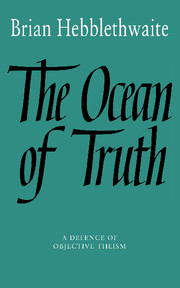Book contents
- Frontmatter
- Contents
- Preface
- 1 Christian belief in God
- 2 The ebbing of theistic faith
- 3 The interiorisation of faith
- 4 Theism in the modern world
- 5 The significance of Kant
- 6 The grounds of theistic belief
- 7 The question of truth
- 8 Religions – theistic and non-theistic
- 9 Life after death
- 10 The Christian Church and objective theism
- Appendix: The Church's ministry
- Notes
- Select bibliography
- Index
6 - The grounds of theistic belief
Published online by Cambridge University Press: 06 July 2010
- Frontmatter
- Contents
- Preface
- 1 Christian belief in God
- 2 The ebbing of theistic faith
- 3 The interiorisation of faith
- 4 Theism in the modern world
- 5 The significance of Kant
- 6 The grounds of theistic belief
- 7 The question of truth
- 8 Religions – theistic and non-theistic
- 9 Life after death
- 10 The Christian Church and objective theism
- Appendix: The Church's ministry
- Notes
- Select bibliography
- Index
Summary
I now attempt to state the case for belief in an objective God, notwithstanding the pressures against theistic metaphysics that have come to the fore in the modern period. Such arguments have both a negative and a positive thrust. Negatively, it needs to be pointed out how weak and implausible are the naturalistic alternatives available today. Positively, it needs to be shown that salient features of our experience, in this as in any age, point in the direction of God and suggest theism as the most plausible world view. Of course the negative and the positive arguments are correlated. It is the same factors that show up the weakness of naturalism and suggest or validate theism.
That, incidentally, is why there is something extremely odd in the common preference in Protestant and Catholic writing today – one thinks of Plantinga and Küng in this respect – for negative over positive apologetic. The idea that arguments against naturalism may clear the way to faith while arguments for the existence of God are somehow religiously improper is incoherent. Certainly faith is more than intellectual assent. But faith is undoubtedly assisted in its dispute with unbelief by positive natural theology. Moreover, if positive and negative arguments are two sides of the same coin, then both aspects should be welcomed. There is no reason for religious minds to be coy about this.
- Type
- Chapter
- Information
- The Ocean of TruthA Defence of Objective Theism, pp. 86 - 101Publisher: Cambridge University PressPrint publication year: 1988



